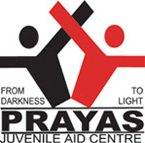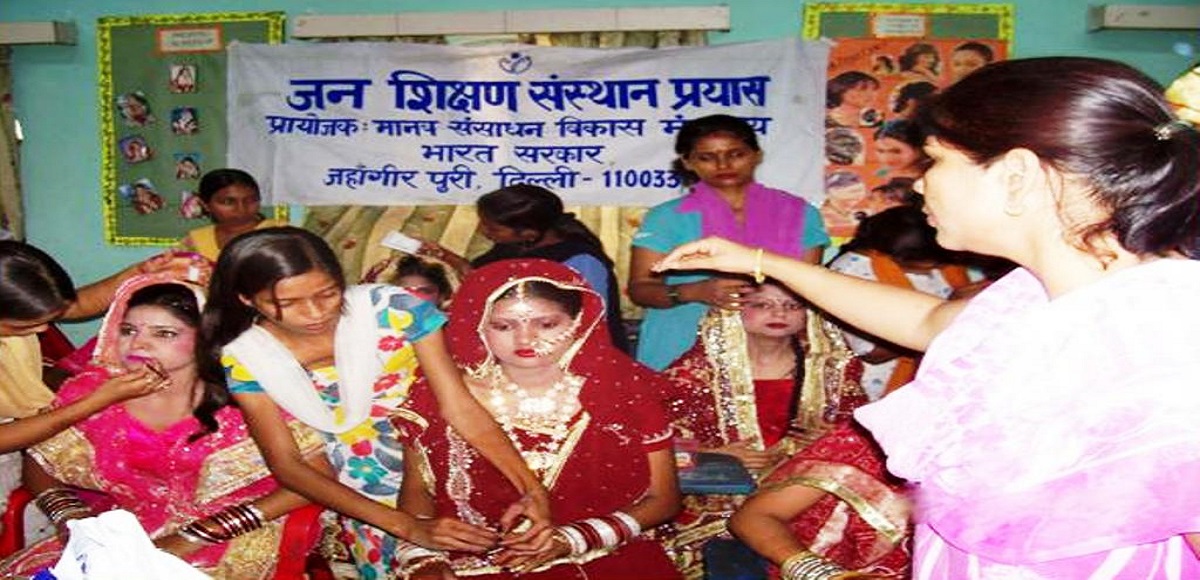Jan Shikshan Sansthan
Jan Shikshan Sansthan Prayas Jahangirpuri Delhi was sanctioned by the Ministry of MHRD vide letter-No F6-1/1999.D-III (AEO/AE- 8) Ministry of HRD Govt., dated 10th April 2000. Jan Shikshan Sansthan Prayas has been working with marginalized, socio economic and educationally backward population in various parts of Delhi for their empowerment and economic rehabilitation since 2000. The empowerment model followed by JSS Prayas Delhi encompasses the component of Adult Literacy, Vocational Education, Skill Development, Life Enrichment Education, Self Help Groups and Women Empowerment activities. It is a unique combination of life, livelihood and literacy skills for the poor adults. JSS Prayas has been able to create programmes beyond the funding provided by the Govt. of India through collaboration, coordination and convergence with various govt. and non Govt. agencies and the huge support provided by the parent body Prayas the national level NGO operating through 247 centers across seven states in India. The SUP- turned 271 JSS has withstand the test of time during the past 50 years and in the process has developed powerful roots as community based service delivery organization, primarily, for the reason that they cater to the most deprived communities by undertaking the most unique programs. The JSSs are imparting vocational skill training programmes at the door step of the beneficiaries with a minimum cost and infrastructure. The Jan Shikshan Sansthans are not working in isolation but also conducts convergence programmes with different departments and are deeply involved in the Sakshar Bharat programmes. The scheme of Jan Shikshan Sansthan (JSS) was initially launched in 1967 as Shramik Vidyapeeth by the Ministry of Education and Culture, Government of India, as a programme of Adult Education for Workers in Urban and Industrial areas. The first Shramik Vidyapeeth was established in Mumbai (Worli) in the year 1967. The scheme of Shramik Vidyapeeth was renamed as Jan Shikshan Sansthan in the year 2001.This programme was conceived as responding to the educational and vocational training needs of numerous groups of adults and young people aimed at improving the vocational skills and quality of life of the industrial workers and their family members as well as of those persons who had been migrating from rural to urban settings implemented by the Ministry of Human Resource Development, GoI. The JSS’s concentrate on the socio-economically backward and educationally disadvantaged groups of rural and urban population such as men, women and youth, employed, self - employed, neo-literates, prospective workers and unemployed youth and priority is to be given to neo-literates/ semi-literates, Schedule Castes, Schedule Tribes, women/girls, oppressed, migrants, slum dwellers and working children. Much more versatile in comparison to the other programs, the JSSs have the most suitable range of programs to provide vocational training and literacy to the given population in collaboration with the local authorities and Panchayats for sustainable life impact changes. It is felt that the Scheme has an appropriate approach to transform the lives of the disadvantaged communities through Vocational Training programs within the long-standing and widespread network, extending the same through CBOs (Community Based Organizations). This intervention intends to associate the 57 million illiterates/school drop-outs under ‘Sakshar Bharat’ Adult Literacy Program with emphasis on imparting vocational and skill development to help the huge left out population to attain the national target of the much-needed 500 million skilled man-power by 2022. JSS can serve as one of the most powerful complementary Schemes having its own space in our country with 125 crore population having a huge number of under-educated and unskilled workforce, 93% of them being in the Unorganized Sectors. JSSs provide training to a pool of resource persons and master trainers, generate skilled work force and promote awareness on relevant social issues. JSSs cover Saksharta Mission, Swachata Bharat Abhiyan, Jan Dhan Yojana, MUDRA and other schemes related to green energy, reproductive and child health, immunization, nutrition, water and sanitation etc multiple issues. Target Group The mandate of JSS is to provide vocational training to Non-literate, Neo-literate as well as School dropouts (upto 8th standard). The priority groups are Women, SCs, STs, OBCs and Minorities and conducts programme in rural and tribal areas. The Objective of JSS (1). To improve the occupational skills and technical knowledge of the neo-literate and the trainees and to raise their efficiency and increase productive activities. (2). It was also meant to provide technical resource support for the neo-literates in both urban and rural areas for tacking up vocational and skill development programmes. (3). To organize equivalency programs through Open Learning System like IGNOU and NIOS. (4). To widen the range of knowledge and understanding of the social, economic and political systems in order to create critical awareness about environment. (5). To promote National goals such as secularism, national integration, population and development, women’s equality, protection and conservation of the environment. The Board of Management (BoM) of JSS: The affairs of the JSS are governed by a board of management comprising 15 members with 6 official members which includes the JS (AE/DG NLM), state director of Adult/Mass education, District Education Officer, representative of District Urban Development agency, representative of local self-government and representative of bank. The term of Board of Management is for a period of three years. 6 Board of Management of Jan Shikshan Sansthan, Prayas Delhi, have been constituted till date. As per the guidelines issued by the MHRD, the first Board of Management was constituted on 10th July, 2000 and 1st meeting of BOM was conducted on 11.07.2000.Prayas ImpactReal Impact, Measurable Results
270
fundraising & donation campaign
89
of beneficiaries have increased coping skills
93
of beneficiaries saw an increased income or educational level
83
increased community needs
It’s not just a donation, it’s an
investment in a children’s future…
Support by volunteering
Become a Volunteer
